<From Overseas Office> [Indonesia] Report on the travel to Indonesia in Covid-19 pandemic, from preparation to leave Japan- Quarantine life- and now.
- Release date: Dec 02, 2021
- 5573 Views
Introduction
Two years have passed since the first case of the new coronavirus was identified in the world. For some it’s been a long time, for others it’s been a blink of an eye. I myself had to work remotely from Japan for about a year after my assignment in Indonesia was postponed. It was a hectic year for me as I had to go back to Japan for vaccination immediately after I started my assignment in Indonesia.Since the beginning of October I have heard news of a decrease in the number of infected people in Japan and some countries in South East Asia. It was a relief to see that countries were easing their entry requirements for people from outside the country, but the discovery of Omicron variant at the end of November means that restrictions are being tightened again.
In this issue, I would like to share with you my experience of travelling to Indonesia (Jakarta) from Japan, where I had returned temporarily for vaccinations in early October, and the current situation in Jakarta.
Preparing for departure
The following are the conditions and documents required for departure from Japan to Indonesia. (As of the end of November 2021)In my case, I entered Indonesia with a temporary residence permit (ITAS).
– ITAS/ITAP (Limited/Permanent Stay Permit Card) holders
– Holders of diplomatic and official residence permits
– Visits on diplomatic or official visas
– Visit visa
– Temporary visitor visa
– Foreigners with APEC business travel cards and traditional border crossers
<Required documents>
– Documents that prove the above conditions
– Vaccination certificate (must be written in English and the required number of doses must have been taken at least 14 days before departure)
– Certificate of negative PCR test taken within 72 hours of entry into Indonesia
– Hotel booking confirmation for the quarantine period.
Requirements and required documents may change from time to time, so please check the Ministry of Foreign Affairs’ website for the latest information.
A negative PCR test certificate must be written in English for international travel. There are two methods of specimen collection for the PCR test: nasopharyngeal and saliva. This is not specified in Indonesia, but it should be noted that in some countries only nasopharynx is approved.
On a side note, I saw a person standing in line at the airport check-in counter who was unable to leave the country because the spelling of the name on the negative PCR certificate was wrong. The airport staff called the issuing authority and asked them to send a corrected document as soon as possible, but I wonder if that person managed to leave the country safely.
Departing Japan
In early October, Haneda Airport seemed busier than when I departed from Japan in May, perhaps due to the fact that some countries had started business traffic. The cabin was spacious, with seats available for passengers with seat assignments that left the seat next to them empty.
Entering Indonesia
The scene is a nostalgic one, with almost all passengers standing up as soon as the plane is signed off after landing. At Wizz Corona, when the plane arrives, passengers are escorted out of the aircraft by blocks of seats. For those who wish to complete immigration as quickly as possible, it is recommended to secure a seat as far forward as possible.
In the terminal, we went through the following procedures. 1.
1. confirmation of the negative certificate of PCR test in Japan, vaccination certificate, and the result of medical checkup to be filled out at the airport by the staff
2. 1st PCR test
3. immigration inspection
4. baggage receipt
5. customs check
6. meet the staff of the hotel for quarantine and leave your passport with them (passport will be returned the next day)
7. transfer to the quarantine hotel by hotel-arranged car
I felt that the waiting time for 1 and 2 was particularly long. Chairs are placed at equal intervals in the terminal, and procedures are carried out as you move from block to block under the direction of a staff member. In some cases, you will be asked to present the necessary documents more than once, so it is convenient to carry them in a file.
It took about 1.5 hours from arrival to departure from the airport, which was much smoother than the 3 hours it took when I entered Japan in May.
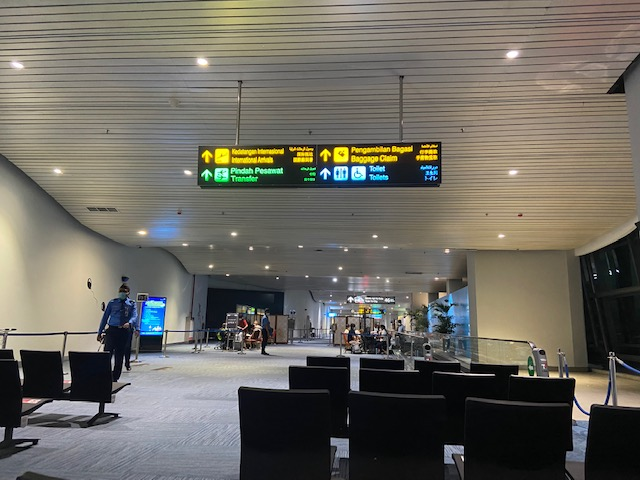
Waiting area in the terminal
If you ignore your turn and try to move forward, you will be immediately stopped by a staff member.
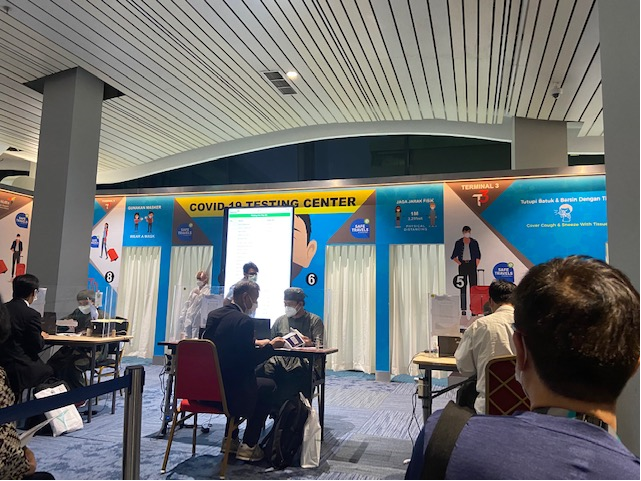
PCR testing station
In a private room with white curtains in the back of the room, you will take turns to be tested for PCR.
The results will be sent to the hotel the next day.
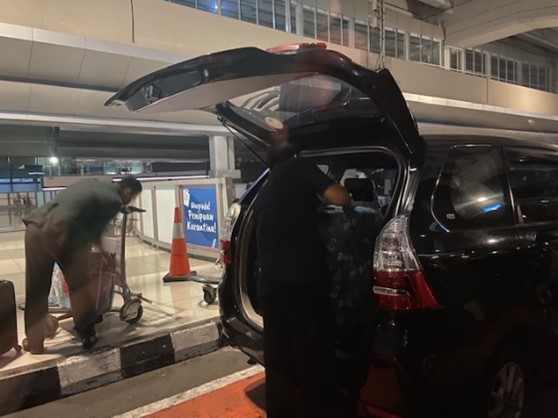
Quarantine period at the hotel
When I entered the country, I had to spend seven days in compulsory isolation in a hotel.During this period, you are not allowed to step out of your hotel room. I have experienced hotel isolation in Japan, but compared to business hotels in Japan, hotel rooms in Indonesia are more spacious, so I didn’t feel that much pain, but it seems to vary from person to person. No room cleaning is done during your stay, but sheets and towels can be changed. Also, the hotel I was staying at included a laundry service, so I didn’t have to worry about washing my clothes.
The second PCR test is taken on day 6 and, if negative, you may check out on day 7.
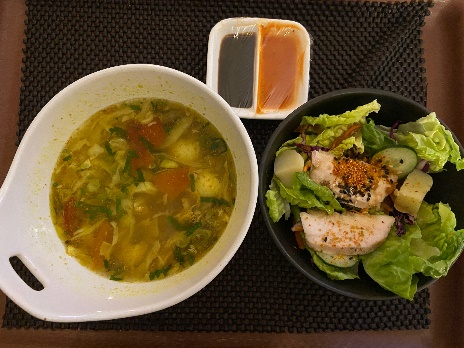
Meals were the only thing he looked forward to during quarantine.
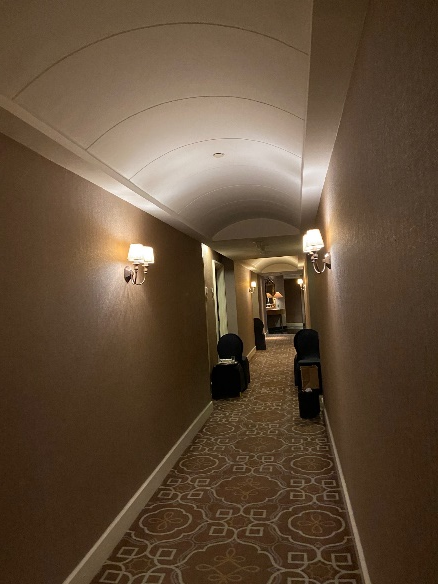
Meals are placed on chairs in front of the room door to avoid contact with staff.
Jakarta today
Activity restriction levels in Indonesia are managed by the government in five levels based on the situation of the COVID-19. Until recently, Jakarta was at the lowest level, level 1, but in the last few days this has been changed from level 1 to 2. The government has also just announced a ban on returning home for the New Year holidays and a ban on paid holidays for civil servants and private sector employees. In Jakarta, we have heard that the vaccination rate has reached 99%, but the fact that the government has tightened the regulations so severely shows that it is desperate to avoid the worst of the medical crisis at all costs. In Indonesia, the registration of an app called “PeduliLindungi” is mandatory, in which functions such as proof of vaccination against coronavirus, negative certificates and contact notification are compiled. In Jakarta, you will need to present this app to go anywhere in Jakarta, including office buildings, shopping malls, restaurants and MRT.If you have been vaccinated in Japan, you will need to apply to register your vaccine record on the dedicated website of the Indonesian Ministry of Health. Those who are planning to travel from Japan are advised to apply in advance. In some cases, it may take a few days from application to approval.
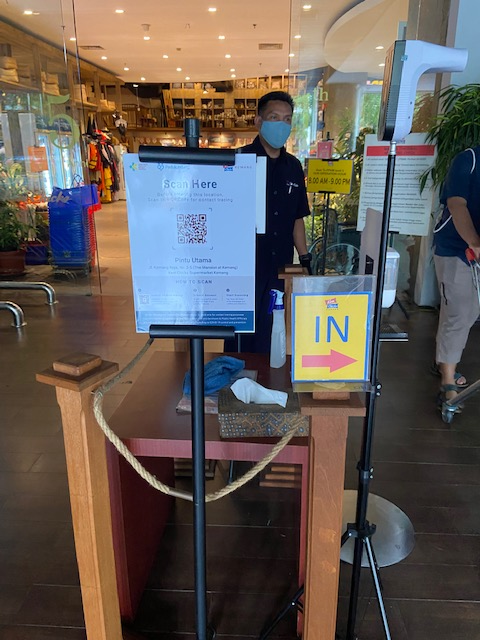
Everywhere you go, there is a QR code for this scan and security staff at the entrance to the building.
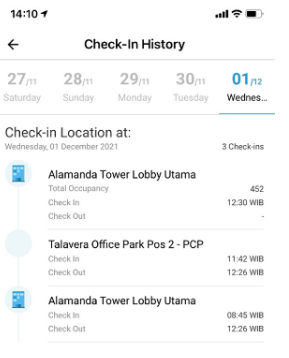
This is how your activity history on the app is displayed. It can feel like you are being monitored everywhere you go.
Ride-hailing app (Grab) interface
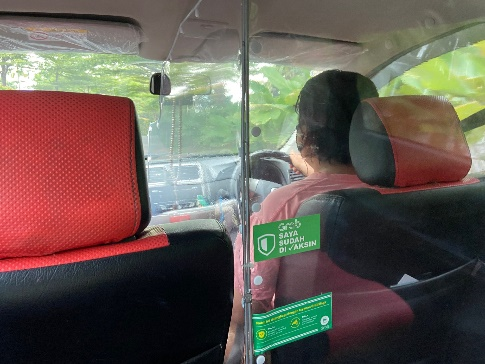
In Jakarta, where rail service is only available on certain sections of the city, cars are an important means of transportation. With Grab, a major car-dispatch application, it is possible to arrange for a “GrabCar Protect” vaccinated driver for an additional fee. Alcohol gel and plastic partitions between the driver and passengers are often installed in the car, so you can use the car with peace of mind.
MRT
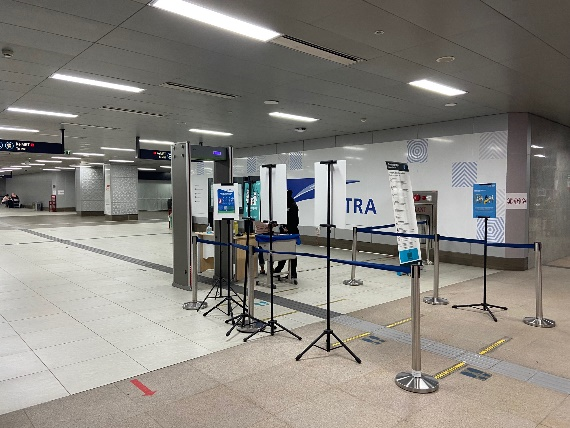
In front of the station's ticket gate; after completing the three steps of PeduliLindungi scanning, temperature check, and luggage check, one can enter the ticket gate.
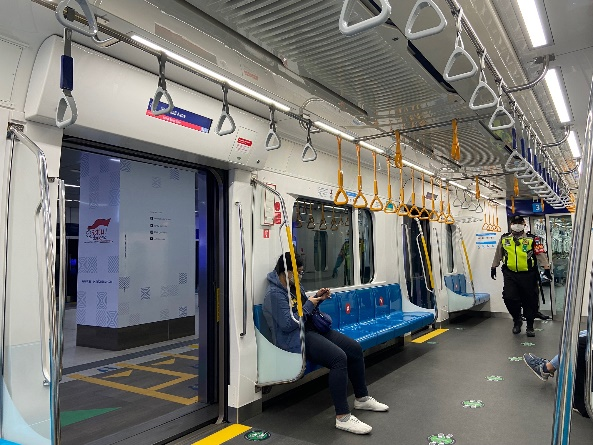
Finally.
When you spend time in Jakarta, you always get the impression that everywhere you go is tightly controlled by the government. I sometimes feel comfortable in restaurants with wide seats and facilities with limited number of people. This has kept me safe, but I wonder how long this coexist with COVID-19 will last. I myself am disappointed by the restrictions on activities during the New Year holidays, but I hope that things will return to normal soon.-

Author profile
Sumire Shibazaki
Senior Research Manager, Intage Indonesia. After 8 years in charge of domestic research at the Intage Group, I worked in a department that oversees overseas research as outbound research from Japan and the business of overseas subsidiaries.I have been in charge of more than 20 countries so far. I had planned to make my long-awaited debut as an expatriate in 2020, but it was postponed due to the impact of COVID‑19. For about a year, I was in charge of research in Indonesia as a remote representative from Japan, and finally arrived in Indonesia in May 2021.
-

Editor profile
Fong-Tat CHEW
 Global Market Surfer
Global Market Surfer CLP
CLP